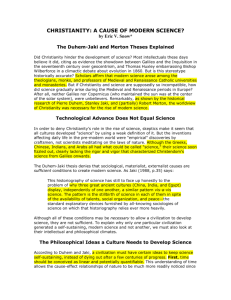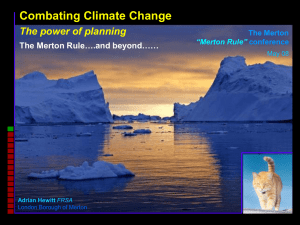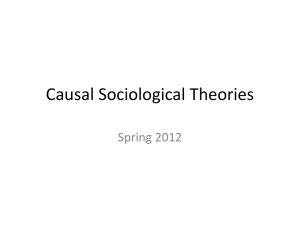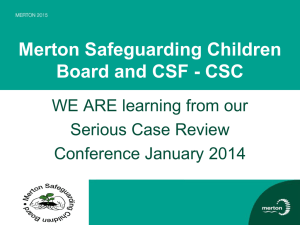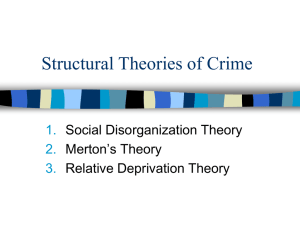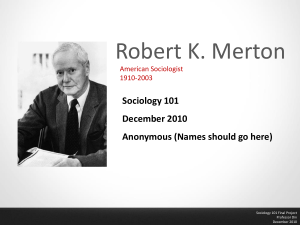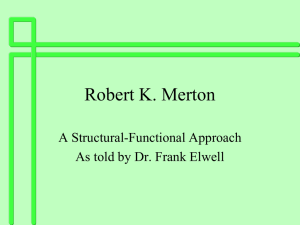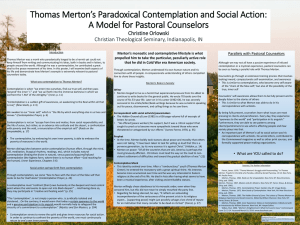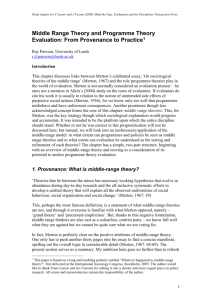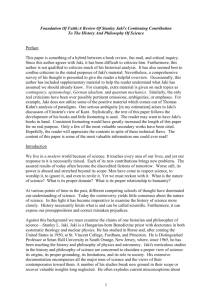Did Christian Theology Help to Cause Science?
advertisement
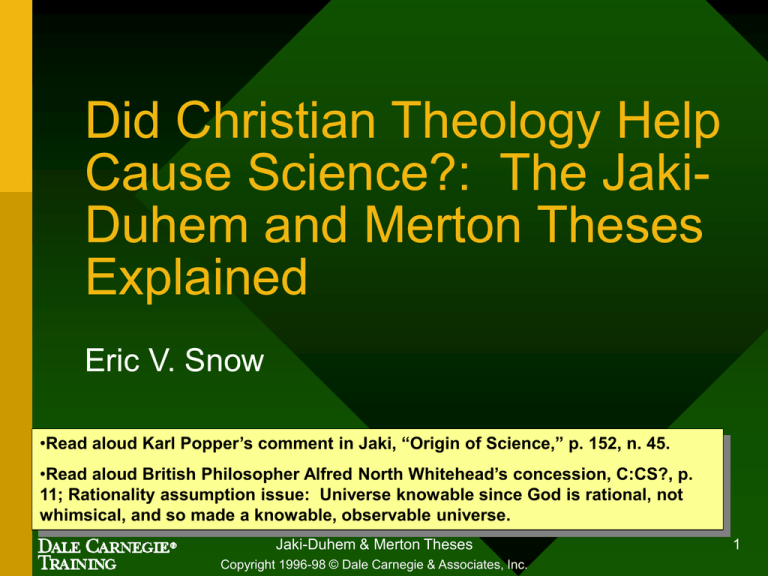
Did Christian Theology Help Cause Science?: The JakiDuhem and Merton Theses Explained Eric V. Snow •Read aloud Karl Popper’s comment in Jaki, “Origin of Science,” p. 152, n. 45. •Read aloud British Philosopher Alfred North Whitehead’s concession, C:CS?, p. 11; Rationality assumption issue: Universe knowable since God is rational, not whimsical, and so made a knowable, observable universe. Jaki-Duhem & Merton Theses Copyright 1996-98 © Dale Carnegie & Associates, Inc. 1 If Christianity is blamed for causing science . . . • . . . then Christian theology should be credited for causing science. • UN’s Environmental Programme’s Global Biodiversity Assessment’s condemns Christian ideas that desacralized nature, made man distinct from the world. •1. Read aloud quotes from UN’s report, as in p. 26, “C:CS?”; Origin, p. 107;154, n65 •2. Read Jaki’s witty retort, p. 27, “C:CS?”; Origin of Science, p. 107. Jaki-Duhem & Merton Theses 2 Bad or incomplete explanations for the rise of science • Must explain why modern science rose in early modern Europe first, not elsewhere. • Other civilizations also had peace, wealth, social organization, educated elite, etc. – Limits to sociological explanations • Intellectual climate is absolutely crucial – Ideas have consequences – Marxist/materialist bias against analyzing – Cultures won’t automatically develop science Jaki-Duhem & Merton Theses •Quote Jaki, in C:CS?, p. 3; Savior of Science, p. 35; avoid loose, broad def. of “sci.,” why 3 Christian ideas, not just Greek, needed for the birth of science • Definition of self-sustaining “science” crucial, it isn’t wisdom or practical technology. • Duhem-Jaki thesis: Christian theology after centuries eventually drives out or restrains pagan ideas so science can be born. • Merton thesis: Like Weber’s on Calvinism helping cause the rise of capitalism. • Puritanism’s beliefs and practical values promoted the rise of science in England. Jaki-Duhem & Merton Theses 4 For science to develop, what Christian ideas did it need? • Time is conceived of as linear, from creation, not cyclical, as per pagan view; is quantifiable. – Christians don’t want crucifixion literally repeated!; 1x for all. • Clarifies cause-effect relationships, succession actions – Chinese example of chronological confusion • Avoids complacency and/or hopelessness since no lasting developmental progress is possible. – E. Indian examples, repetition causes also stagnation, etc. •Chinese example, quote Jaki, in C:CS?, p. 7. &East Indian examples, C:CS?, p. 12; 5 Jaki-Duhem Merton Theses Reincarnation/transmigration of souls: Goal is to try to escape cycle, join Brahma; Sci. abs. Req. What bad pagan ideas prevented the rise of science? • Organismic view of nature hinders scientific mind-set: – All of universe/world one huge organism that is born, lives, dies, reborn. (Applies to it cyclical view of time/reincarnation). Denies creation from nothing, ex nihilo; world always existed. – Pantheistic: Everything is divine and/or alive, has its own consciousness. Mankind not qualitatively different from world. – If has will of own, universe can’t be reliably predicted, has no firm, steady laws of nature. Heavenly laws not = to earthly laws – It conceives of stars, planets, rocks, water in oceans, etc., as alive, as gods, as divine, etc. Planets named for gods. – Christianity allowed for the de-animation of the heavens and of nature: Non-living rocks, inorganic outer space made modern science of astronomy possible; laws of physics then universal. 6 Jaki-Duhem & Merton Theses •Quote Buddhist monk attacking creation ex nihilo, C:CS?, p. 6; to Chr., world inferior to Creator; More bad pagan ideas that hindered scientific development • Must avoid pseudo-scientific “explanations” that have nothing to do with what occurs in physical reality. – Astrology: Idea that the positions of stars determine human destiny crippling to taking initiative in life. – Chinese examples: Yin/Yang, I Ching (Book of Changes) for divinations. – People don’t search for better, more correct explanations of natural phenomena when they think they know the “causes” already. Read alleged final causes into events, substances. – Aristotle’s “four elements” theory example, pagan Greek. •Chinese examples, C:CS?, p.Jaki-Duhem 8, top; Christian opp.to astrology more successful than in other 7 & Merton Theses civiliz.: Augustine against, etc. What Christian ideas promoted the rise of science? • The external world is both real and fundamentally orderly. – People won’t carefully investigate, analyze, or quantify illusions and chaos; meditating on nature isn’t “science.” – Hindu/Buddhist concept of Maya, “All is illusion,” cripples would-be physical sciences in India, China, etc. – If nature whimsically controlled by millions of gods, deities, godlets, spirits, and demons, not predictable. – Christian view that God is rational and trustworthy, so therefore His physical creation is knowable; man’s mind reliable. – Islam’s Allah much more willful and unpredictable than Jehovah, ultimately hinders Islamic science. & Merton Theses •Quote C:CS?, pp. 21-22; Oresme’sJaki-Duhem clock maker metaphor for God; later somewhat misused by Deists; Christ’s body real (I Jn, vs. Gnostics), so physical world real; 8 Balance between faith and reason needed • Balanced synthesis of Thomas Aquinas and Scholasticism critical to late Medieval science’s rise. – Catholicism ultimately finds a way to accept much of Aristotle’s philosophy without going overboard either way. – Had to reject bad ideas of Aristotle (heavens alive) while accepting good ones (logic) to have science. – Bishop of Paris Tempier’s 1277 condemnation crucial. • Islam’s lack of balance stops its scientific development. – Muslim philosophers Mutazilites, Avicenna, Averroes subordinate Islamic theology to Aristotle’s ideas. – Muslim theologians Al-Ghazzali and al-Ashari often very mystical, emphasized Allah’s will over His reason. •C:CS?, p15. Ghazzali’s “Incoherence of Philosophers” promoted occasionalism, God’s Jaki-Duhem & Merton Theses constant direct intervention in creating all effects in world. Averroes double truth theory, that 9 Merton’s thesis: Did Puritanism help cause science? • Sociological, “externalist” explanation, not intellectual, “internalist,” from within science’s own history. • 17th century science in England promoted by Puritan values of utility, reason, empiricism, and seeking the glory of God. • Serve God through serving the community through useful trades, “callings,” vs. monastic ideal of contemplative withdrawal from world. • Reason and education both praised for practical purposes; vs. speculative philosophy, scholasticism. • High % of 17th century British scientists Puritans. Jaki-Duhem & Merton Theses 10 Biblical beliefs and values helped to cause science • World’s overemphasis on Galileo’s condemnation by Catholicism’s Inquisition gives false impression. – Galileo and da Vinci depended on Oresme, Buridan, their medieval predecessors. – Jaki-Duhem and Merton theses make important correctives. – Synthesis of Greek philosophy, Hindu-Arabic numerals, and Christian theology created true self-sustaining science. • Sources: – Stanley Jaki, The Savior of Science, The Origin of Science and the Science of Its Origin, Science and Creation. – Robert Merton, “Science in Seventeenth Century England.” – Pierre Duhem, Le System du Monde: Proposed project to translate it into English, distribute tounbiased universities. •Must note continuity from medieval period to early modern; for history of sci., don’t Jaki-Duhem Merton Theses 19th c. error); Jaki, “Origin,” 61-62.11 jump from Greeks to Galileo (Herbert Spencer,&Wm. Whewell
